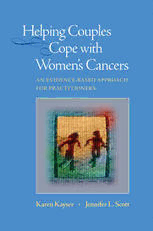
Helping Couples Cope with Women’s Cancers: An Evidence-Based Approach for Practitioners PDF
Preview Helping Couples Cope with Women’s Cancers: An Evidence-Based Approach for Practitioners
Helping Couples Cope with Women’s Cancers · Karen Kayser Jennifer L. Scott Helping Couples Cope with Women’s Cancers An Evidence-Based Approach for Practitioners 123 KarenKayser JenniferL.Scott GraduateSchoolofSocialWork SchoolofPsychology BostonCollege UniversityofTasmania ChestnutHill,MA02467,USA Hobart,Tasmania7001,Australia [email protected] [email protected] ISBN:978-0-387-74802-3 e-ISBN:978-0-387-74803-0 LibraryofCongressControlNumber:2007936601 (cid:2)c 2008SpringerScience+BusinessMedia,LLC Allrightsreserved.Thisworkmaynotbetranslatedorcopiedinwholeorinpartwithoutthewritten permission of the publisher (Springer Science+Business Media, LLC, 233 Spring Street, New York, NY10013,USA),exceptforbriefexcerptsinconnectionwithreviewsorscholarlyanalysis.Usein connectionwithanyformofinformationstorageandretrieval,electronicadaptation,computersoftware, orbysimilarordissimilarmethodologynowknownorhereafterdevelopedisforbidden. Theuseinthispublicationoftradenames,trademarks,servicemarks,andsimilarterms,eveniftheyare notidentifiedassuch,isnottobetakenasanexpressionofopinionastowhetherornottheyaresubjectto proprietaryrights. Whiletheadviceandinformationinthisbookarebelievedtobetrueandaccurateatthedateofgoing topress,neithertheauthorsnortheeditorsnorthepublishercanacceptanylegalresponsibilityforany errorsoromissionsthatmaybemade.Thepublishermakesnowarranty,expressorimplied,withrespect tothematerialcontainedherein. Printedonacid-freepaper 9 8 7 6 5 4 3 2 1 springer.com Inmemoryofourmothers,Verna B.E.Kayser,andAudreyB.Scott,whofirst taughtustheimportanceofrelationshipsin copingwithillness. Preface Our work with cancer patients has been an interweaving of both our professional andpersonallives.Eachofusbeganourcareersinthisareaaround20yearsago.In this preface, we individually describe the journeys that led us to our collaboration onthisbook,beginningwithProfessorKayser. Iwasworkingasapost-doctoralfellowontheChildhoodCancerProjectatthe University of Michigan. This was a clinical research program that offered home- basedpsychosocialservicestofamilieswhohadachildwithcancer.AlthoughIhad workedasacouplesandfamilytherapistforyearsbeforethepost-doc,thiswasmy firstexperiencewithseeinghowcancerdiagnosisandtreatmentcanaffectanentire family system. Spending time with families in their own homes gave me a more in-depth look into not only the inner workings of the family but also the context of their coping. What intrigued me was how some families who lived in affluent suburbancommunitieswithseeminglyendlessresourceswerenotadjustingtotheir child’sillnessaswellassomeofthefamilieswevisitedinthepoorestpartsofthe city of Detroit. Numerous questions about what constitutes good coping and what contributes to a good adjustment arose. In addition, I wondered what was the best way for a family, as a whole, to cope. Should family members take on designated rolesaroundmanagingthedemandsoftheillness?Orshouldeveryonebeusingthe samestrategiestocope? When I left Michigan for a university position in Boston, I continued my work onthepsychosocialaspectsofcancer.Thedirectorsofthesocialworkdepartments atBrigham&Women’sHospitalandDana-FarberCancerInstituteencouragedmy researchinterests.Withpractitionersattheseinstitutions,Istudiedtheexperiences ofmotherswithcancerandhowcloserelationshipseitherhelpedorhinderedtheir adjustment. What became clear from this research was the importance of a mutu- ally supportive relationship for coping with the diagnosis and treatment of cancer. Motherswhohadsupportiverelationshipsreportedhigherlevelsofwell-beingand lower levels of depression. They also engaged more frequently in positive health carebehaviors.Basedonthesefindings,Istartedtodevelopapsychosocialinterven- tionthatwouldenhancethecopingofthecancerpatientandherspouseorpartner. Although there were numerous support groups available for patients with cancer, thereseldomwereanyprogramsforpartnersofpatients.Morestrikingly,therewere no programs available for both patients and partners to work on facing the cancer vii viii Preface together,eventhoughthefindingswerequitedefinitivethatsupportivepartnersare crucialtothewell-beingofcancerpatients.Insteadofattemptingtocreatesupport amongagroupofstrangers,itmadesensetometoworkwiththepatient’snatural supportsystem—thepeoplewithwhomshelives. CollaboratingwithDana-FarberCancerInstitute,Brigham&Women’sHospital, andMassachusettsGeneralHospital,IdevelopedthePartnersinCopingProgram.It wasevaluatedthrougharandomizedcontroltrialand,soonafter,Ibeganreporting myfindings.IthendecidedtodisseminatetheProgramtopractitionerswhoworked with patients on a daily basis. Around the same time, I met Professor Scott and we began to learn about each other’s work—the similarities in our perspectives, our interventions, and our research findings. Based on the similarities of studies conductedindifferentcountries,wedecidedtocollaborateandputourinterventions togetherinabook. Justaswestartedourworktogether,Imyselfwasdiagnosedwithbreastcancer. Fortunately,itwasdetectedearlyandsuccessfullytreatedwithsurgeryandradiation treatments.However,itgavemeanewlensthroughwhichIviewthecancerexpe- rience.Onequicklylearnsthatthereisnorightorwrongwaytocope.The“best” coping method depends on one’s personality and life circumstances. Also, cancer isnotasimpledisease—itappearsinvariousforms,intensities,andistreatedbya range of modalities. Similarly, approaches to coping with it will vary from person topersonandcoupletocouple.Oneofthegoalsofourbookistohelppractitioners learntoassistpartnersinacceptingeachother’sindividualwayofhandlingthestress of an illness. It is evident to me that it is not the differences between the partners thatcreatedistressbutratherthewaytheyhandlethesedifferences. KarenKayser AfterearningmyBachelorsDegreesome22yearsago,Itookmyfirstjobasa welfare officer at a cancer treatment center in the city of Brisbane, in the State of Queensland,Australia.Thepeoplediagnosedwithcancer,theirfamilies,andclosest support persons who came to the center often had traveled long distances, many arrivingfromruralandremoteregionsofQueensland.Partofmyrolewastohelp peoplecompletethenecessarypaperworktoclaimgovernment reimbursementfor travel,accommodation,andassociatedmedicalcosts.Aswefilledinthepaperwork together, I observed that the couple and families who seemed to be adjusting well wereveryintouchwitheachothers’thoughtsandfeelingsabouttheircancerexpe- riences.Theyseemedtobecopingasateam.Thoughtheirindividualcopingstyles wereoftendifferent,theirwaysofcopingseemedcomplementary.Thisseemedto givefamilymembersgreaterstrengththaniftheystoodalone. The things I learned from these families, and the wonderful medical and allied health colleagues I worked with, have stayed with me for life. These experiences alsoinspiredmetogobacktouniversityandseekfurthertrainingtogaintheclinical skills I felt I needed to help families cope with cancer. I completed my Masters Degree in Clinical Psychology, and then pursued my doctoral research. I did not knowitatthetime,butonoppositesidesandindifferenthemispheresoftheworld, Preface ix Karen and I were designing and testing similar programs to harness the power of couples’copingwithcancer. IdevelopedCanCOPE,acouple-based,cognitive-behavioralcopingtrainingand support-enhancement intervention. CanCOPE was evaluated empirically through randomized control trials. It was found to be effective for improving adjustment for both the women and their partners, across a range of quality of life outcomes, includingmood,copingbehaviors,supportivecommunication,sexualintimacy,and female body image. I have since modified some components of CanCOPE to suit differenttypesofcloserelationships,wherethewoman’snominatedsupportperson isanotherfamilymemberorclosefriend. While I was writing up the results of my trial of CanCOPE for my doctoral dissertation, my dear mother was diagnosed with advanced stage cancer. I moved backtothefamilyhometogivesupporttomyparents.Iwillbeforevergratefulfor this time with them. With dignity, love, and a great sense of fun, they got on with livingandgettingthemostoutofeachday.Theyshowedmefirsthandhowcoping asacouplecansustainpeopleintheirdarkesthours,evenwhenthismeanstheloss ofanintimatebondthat,intheircase,lasted50years. JennScott Acknowledgments My development of the Partners in Coping intervention would not have been pos- sible without the support and generosity of the staff at Dana-Farber Cancer Insti- tute(DFCI),BrighamandWomen’sHospital,andMassachusettsGeneralHospital (MGH).Inparticular,IwanttothankDr.LawrenceShulman,Dr.UrsulaMatulonis, and Dr. Eric Winer for their commitment and dedication to psychosocial care for patients and families as part of best practices in medicine. I am grateful to Nancy Borstelmann, Ann Daniels, Martha Burke, Barry Feldman, and the clinical social workersfromDFCIandMGHwhohelpedwiththedailyworkofrecruitingcouples andimplementingthePartnersinCopinginterventions.Iespeciallyappreciatethe time, commitment, and fortitude of the couples who participated in my research duringadifficulttimeintheirlives.IamgratefulforagrantfromtheMassachusetts DepartmentofPublicHealthBreastCancerProgramthatfacilitatedmyresearch. IalsothankOscarBarbarinwhofirsttaughtmeaboutfamily-basedinterventions with cancer patients and Tracey Revenson and Guy Bodenmann who continue to inspire me in my research on dyadic coping. I deeply appreciate the support of colleague and friend, Jane O’Rourke, who read early drafts of the manuscript and providedanexperiencedclinicalperspectivetomyresearch. I am grateful to my husband, Fred Groskind, whose enduring support helped me in my own journey with cancer and whose tenacious editing helped transform our academic writing into a more readable manuscript. I would like to thank my daughter, Emma, for her patience while I worked on this project. Finally, I thank Jenn Scott for joining me in this book project. Her collaboration and good humor wereinvaluable. KarenKayser I would like to thank my colleagues and friends working in couples and health who share my passion and have inspired me over the years. In particular, I thank KarenKayser,DonBaucom,NinaHeinrichs,andTanjaZimmerman.Iverymuch appreciatethewarmthandsupportshowntomebymyworkmatesandpostgraduate students in the School of Psychology at the University of Tasmania. I respect the courageofthefamiliesinvolvedinthe“CanCOPE”projects,whoworkedwithme xi xii Acknowledgments at such challenging times in their lives, and who generously shared their cancer experiences so that others may benefit. I am grateful for research grants from the National Health and Medical Research Council (NHRMC Id 9937170; Australian ClinicalTrialsRegistryNo.12607000061437)andtheCancerCouncilQueensland. Iamdeeplyappreciativeoftheencouragementandunderstandingthatmyfather, brother,extendedfamily,andfriendsofferme,forthehappinessandsenseofpur- posetheserelationshipsbringtomylife.IamgratefultoBenforremindingmethat sharingmakesthings‘Shiny’andtoDavidbecausehealwaystoldmeitwasso. Finally,thankyoutomycousinJoy,whowithgraceandlovegenerouslyshared her artistic vision of the interwoven strength and beauty that flows from “couple living in harrnony”; the theme of her woven tapestry that is the cover art for this book. JenniferL.Scott We would like to thank the editorial staff of Springer Publishers for their help intheproductionofthisbook.Inparticular,wewouldrecognizeAnnaTobiasand JenniferHadleyfortheirextremepatienceandencouragement. KarenKayser JenniferL.Scott
